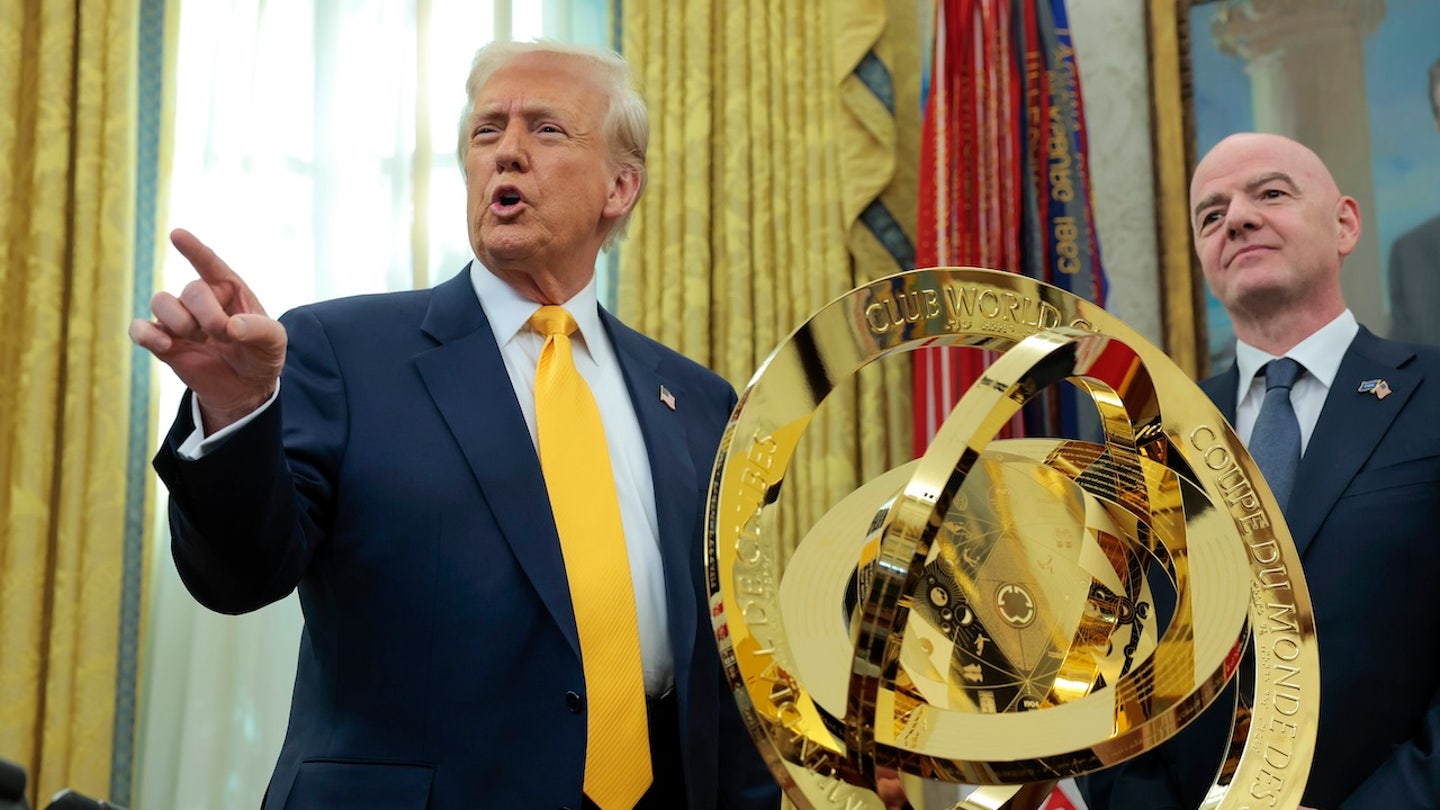
Parity Takes Center Stage: 'Big Noon Kickoff' Crew Sounds Off on First CFP Rankings
Entities mentioned:
- College Football Playoff Committee: Power, Control, Influence
- Big Noon Kickoff Crew: Enthusiasm, Professional pride, Influence
- Urban Meyer: Competitive spirit, Recognition, Curiosity
- Mark Ingram: Pride, Loyalty, Competitive spirit
- Brady Quinn: Righteousness, Indignation, Justice
- Matt Leinart: Enthusiasm, Competitive spirit, Recognition
- Chris Fallica: Determination, Professional pride, Influence
- Dave Portnoy: Enthusiasm, Competitive spirit, Recognition
Article Assessment:
Credibility Score: 75/100
Bias Rating: 50/100 (Center)
Sentiment Score: 70/100
Authoritarianism Risk: 20/100 (Strongly Democratic)
Bias Analysis:
The article presents multiple viewpoints from different analysts, balancing perspectives on various teams and conferences. While individual commentators show some bias, the overall piece maintains a relatively neutral stance.
Key metric: College Football Playoff Rankings
Let me tell you something - this College Football Playoff race is WIDE OPEN, folks! We're seeing a level playing field that's turning the whole season into one massive bowl game! The Big Noon Kickoff crew is bringing their A-game analysis, breaking down every move like it's the Super Bowl! Urban Meyer's scouting report on parity is a GAME-CHANGER - we're talking Cinderella stories left and right! Mark Ingram's carrying the ball for the Big 12, finally getting them into the endzone of respect! Brady Quinn's calling out the refs on this 'eye test' penalty, demanding justice on the field! Leinart's got his eye on the Big Ten championship belt, while Fallica's drawing up the perfect playbook for Texas to make a fourth-quarter comeback! And Portnoy? He's fired up like it's the two-minute drill, folks! This is the kind of wide-open competition that makes college football the GREATEST SHOW ON TURF!

White House reacts after report claims Trump wants new Commanders DC stadium named after him
Entities mentioned:
- Donald Trump: Legacy, Recognition, Power
- Washington Commanders: Ambition, Professional pride, Competitive spirit
- White House: Control, Influence, Loyalty
- Josh Harris: Ambition, Competitive spirit, Recognition
Article Assessment:
Credibility Score: 65/100
Bias Rating: 55/100 (Center)
Sentiment Score: 50/100
Authoritarianism Risk: 40/100 (Generally Democratic)
Bias Analysis:
The article presents multiple viewpoints, including Trump's desires and the Commanders' response. However, it leans slightly towards emphasizing Trump's perspective, giving it more airtime.
Key metric: US Political Influence
Let me tell you something, folks - this is a GAME-CHANGING play in the political arena! The former quarterback-in-chief is looking to leave his mark on the gridiron of American history! Trump's audacious move to get his name on the Commanders' new stadium is like a Hail Mary pass in the fourth quarter of his legacy game. He's stepping up to the plate, swinging for the fences, trying to hit a home run that'll echo through the halls of power long after he's left the field. But let's not forget, this is a team sport, and the Commanders' ownership is playing defense, trying to run out the clock on any premature decisions. It's a high-stakes match where the scoreboard isn't just about points, it's about POWER and INFLUENCE! This could be the championship play that cements Trump's name in the annals of DC sports history or a fumble that costs him big in the court of public opinion. I'm telling you right now, we're witnessing a political power play that'll have repercussions far beyond the stadium walls!

Darryl Strawberry thanks Trump for pardon that makes him 'truly free and clean from all of my past'
Entities mentioned:
- Darryl Strawberry: Redemption, Gratitude, Self-respect
- Donald Trump: Power, Influence, Loyalty
Article Assessment:
Credibility Score: 75/100
Bias Rating: 65/100 (Lean Right)
Sentiment Score: 75/100
Authoritarianism Risk: 35/100 (Generally Democratic)
Bias Analysis:
The article leans right, presenting Trump's pardon in a positive light and extensively quoting Strawberry's grateful response. However, it does include objective facts about Strawberry's past troubles, balancing the narrative somewhat.
Key metric: Presidential Pardons Issued
Let me tell you something, folks - this is a GAME-CHANGING play in the world of presidential pardons! Darryl Strawberry, once a heavy hitter in the MLB, has just scored a GRAND SLAM with this full pardon from President Trump. It's like watching a veteran player make an incredible comeback in the bottom of the ninth! Strawberry's journey from the dugout of addiction to the pitcher's mound of redemption is nothing short of a CHAMPIONSHIP PERFORMANCE. Trump, acting like a savvy coach, has pulled off a surprise play that's got everyone talking. This isn't just a home run for Strawberry - it's a WALK-OFF WIN for second chances in America! I'm telling you right now, this kind of move could change the whole ballgame when it comes to how we view redemption in this country!

Trump pardons ex-MLB star Darryl Strawberry after faith, sobriety turnaround
Entities mentioned:
- Donald Trump: Power, Influence, Legacy
- Darryl Strawberry: Redemption, Self-respect, Legacy
- Major League Baseball: Professional pride, Control, Legacy
Article Assessment:
Credibility Score: 75/100
Bias Rating: 65/100 (Lean Right)
Sentiment Score: 70/100
Authoritarianism Risk: 35/100 (Generally Democratic)
Bias Analysis:
The article leans slightly right, given its source (Fox News) and positive framing of Trump's action. However, it provides balanced coverage of Strawberry's past issues and redemption story.
Key metric: Criminal Justice Reform
Let me tell you something, folks - this is a GAME-CHANGING play by President Trump! He's stepping up to the plate for Darryl Strawberry, showing that even All-Stars can get a second chance. Strawberry's career was like a rollercoaster ride, full of highs and lows, but he's finally found his championship mentality off the field. This pardon is like a walk-off home run for redemption, sending a message that it's never too late to turn your life around. Trump's move here is a curveball in the political arena, showing he's willing to go to bat for those who've paid their dues and changed their ways. It's a real game-changer for criminal justice reform, folks!

Trump to attend Commanders game against Lions to honor military veterans
Entities mentioned:
- Donald Trump: Recognition, Influence, Legacy
- Washington Commanders: Professional pride, Unity, Loyalty
- Josh Harris: Duty, Recognition, Unity
- Pat McAfee: Competitive spirit, Recognition, Influence
- Pentagon: Duty, Security, Control
Article Assessment:
Credibility Score: 75/100
Bias Rating: 55/100 (Center)
Sentiment Score: 60/100
Authoritarianism Risk: 35/100 (Generally Democratic)
Bias Analysis:
The article presents a fairly balanced view, including both positive and potentially controversial aspects of Trump's attendance. It cites multiple sources and provides context from different perspectives.
Key metric: Public Perception of Military Support
Let me tell you something, folks - this is a GAME-CHANGING play in the political arena! President Trump is stepping up to the plate, making a fourth-quarter move to show his support for our military veterans. It's like he's suiting up for the big game, ready to take the field alongside the Commanders. But here's the kicker - the Pentagon's budget shutdown is like a major penalty, taking away the traditional flyovers. It's crunch time, and Trump's looking to score some serious points with the military crowd. The Commanders are playing host, but they've got their own challenges, coming off a tough loss and without their star QB. This is the kind of high-stakes matchup that separates the champions from the also-rans. I'm telling you right now, all eyes will be on that owner's box come Sunday!

Van Jones distances himself from CNN while making pro-Israel statements at antisemitism conference
Entities mentioned:
- Van Jones: Righteousness, Influence, Duty
- CNN: Professional pride, Influence, Control
- Hamas: Power, Control, Revenge
- Israel: Self-preservation, Security, Unity
Article Assessment:
Credibility Score: 65/100
Bias Rating: 65/100 (Lean Right)
Sentiment Score: 55/100
Authoritarianism Risk: 30/100 (Generally Democratic)
Bias Analysis:
The article leans right, showing skepticism towards progressive views and CNN while presenting pro-Israel statements favorably. The framing of Van Jones' comments and the author's personal interjections contribute to the right-leaning bias.
Key metric: US-Israel Relations
Let me tell you something - this story is a GAME-CHANGER! Van Jones is stepping up to the plate for Team Israel in a major way, folks. He's calling out the opposition and laying down some serious defensive plays against antisemitism. Jones is showing a real championship mentality here, breaking away from his own team's playbook to make a clutch move in support of the underdog. This is fourth quarter stuff, people! He's putting it all on the line, going against his own sideline to stand up for what he sees as the right play. It's a bold strategy, Cotton - let's see if it pays off for him!

Jacksonville Jaguars Will Reportedly Play 2027 Home Games in Orlando
Entities mentioned:
- Jacksonville Jaguars: Professional pride, Ambition, Legacy
- NFL: Power, Control, Influence
- Orlando: Ambition, Recognition, Competitive spirit
Article Assessment:
Credibility Score: 75/100
Bias Rating: 50/100 (Center)
Sentiment Score: 60/100
Authoritarianism Risk: 20/100 (Strongly Democratic)
Bias Analysis:
The article presents a balanced view of the situation, reporting facts without apparent political lean. It includes multiple perspectives and sources, maintaining a neutral stance on the relocation decision.
Key metric: NFL Fan Engagement
Let me tell you something - this is a GAME-CHANGING play for the Jacksonville Jaguars! They're pulling a classic road game strategy, but on their own turf! This temporary relocation to Orlando is like calling an audible at the line of scrimmage. The Jags are showing true championship mentality, adapting their game plan to keep their competitive edge during stadium renovations. It's a fourth-quarter move that could either be a touchdown or a fumble for fan loyalty. Orlando is stepping up to the plate, ready to play host in this high-stakes match-up of cities. I'm telling you right now, this is the kind of strategic play that separates the contenders from the pretenders in the NFL arena!

Who's 'The Best'? Kane, Yamal, Bonmatí on FIFA's Shortlist For Awards
Entities mentioned:
- Ousmane Dembele: Competitive spirit, Recognition, Legacy
- Harry Kane: Ambition, Determination, Professional pride
- Lamine Yamal: Ambition, Recognition, Competitive spirit
- Alessia Russo: Competitive spirit, Recognition, Professional pride
- Aitana Bonmatí: Competitive spirit, Legacy, Recognition
- FIFA: Influence, Recognition, Legacy
Article Assessment:
Credibility Score: 85/100
Bias Rating: 50/100 (Center)
Sentiment Score: 75/100
Authoritarianism Risk: 15/100 (Strongly Democratic)
Bias Analysis:
The article presents a balanced view of both men's and women's awards, giving equal attention to multiple candidates. It relies on factual achievements and doesn't show preference for specific players or nationalities.
Key metric: International Competitiveness in Soccer
Let me tell you something - this is the CHAMPIONSHIP GAME of individual soccer awards! We've got a STACKED ROSTER of superstars going head-to-head in a no-holds-barred battle for soccer supremacy! Dembele and Yamal are back in the ring for a rematch after their Ballon d'Or bout, while Kane is finally stepping up to the plate after years of near-misses. On the women's side, Russo and Bonmatí are locked in a fierce overtime struggle that could go either way! This isn't just an award, folks - it's a WORLD CUP of individual talent, where every nominee is bringing their A-game and championship mentality. The competition is so fierce, you can almost hear the roar of the crowd as these athletic gladiators vie for the ultimate trophy in their sport. It's fourth quarter, the clock is ticking, and EVERYONE is leaving it all on the field!

2026 FIFA World Cup: Draws for Qualifying Playoffs in Zurich on Nov. 20
Entities mentioned:
- FIFA: Control, Power, Influence
- Italy: Competitive spirit, Pride, Legacy
- Mexico: Pride, Recognition, Competitive spirit
- Donald Trump: Power, Recognition, Influence
- England: Pride, Competitive spirit, Ambition
Article Assessment:
Credibility Score: 85/100
Bias Rating: 50/100 (Center)
Sentiment Score: 65/100
Authoritarianism Risk: 20/100 (Strongly Democratic)
Bias Analysis:
The article presents a factual account of the upcoming World Cup qualifying process without apparent political leanings. It objectively reports on the draw procedures and participating teams.
Key metric: International Soccer Competitiveness
Let me tell you something - this World Cup qualifying playoff draw is going to be an absolute GAME-CHANGER! We're talking about a high-stakes tournament before the tournament, folks! These teams are stepping up to the plate for their shot at glory, and let me tell you, the pressure is ON! It's fourth quarter, do-or-die time for powerhouses like Italy, who are used to being in the championship conversation but now find themselves in the wild card race. This is RIDICULOUS! The European bracket is like a sudden death overtime, with 16 teams battling it out for just 4 spots. Talk about a defensive struggle! And don't even get me started on the intercontinental playoffs - we're looking at a true world series of soccer here, with teams from across the globe leaving it all on the field for those final two golden tickets. This is the kind of competitive spirit that separates the champions from the also-rans, folks. I'm telling you right now, we're in for some edge-of-your-seat, nail-biting action come March!

Ex-FIFA exec accuses President Gianni Infantino of violating political neutrality rule by praising Trump
Entities mentioned:
- Miguel Maduro: Righteousness, Professional pride, Justice
- Gianni Infantino: Power, Influence, Ambition
- Donald Trump: Power, Recognition, Competitive spirit
- FIFA: Control, Influence, Professional pride
Article Assessment:
Credibility Score: 75/100
Bias Rating: 55/100 (Center)
Sentiment Score: 35/100
Authoritarianism Risk: 40/100 (Generally Democratic)
Bias Analysis:
The article presents multiple viewpoints, including critiques and defenses of the involved parties. While it leans slightly towards skepticism of Infantino's actions, it maintains a generally balanced approach by providing context and quoting relevant rules.
Key metric: International Diplomatic Relations
Ladies and gentlemen, we've got a BLOCKBUSTER match-up on our hands! The political playing field is heating up as former FIFA exec Miguel Maduro throws a CURVEBALL at current FIFA president Gianni Infantino. Let me tell you something, this is a GAME-CHANGING accusation! Infantino's alleged violation of FIFA's political neutrality rule is like stepping out of bounds in the final seconds of a championship game. The stakes couldn't be higher as Infantino's praise for Trump threatens to turn FIFA's neutral stance into a POLITICAL PENALTY SHOOTOUT. This is the kind of move that could bench a star player, folks! We're seeing a clash of titans here, with Maduro playing defense for FIFA's integrity while Infantino seems to be running interference for Team Trump. It's a high-stakes match where the rulebook itself is being put to the test. Will Infantino's apparent friendship with Trump prove to be a winning strategy or a COSTLY FUMBLE for FIFA's global reputation? I'm telling you right now, this could be a GAME-CHANGER in the world of international sports governance!